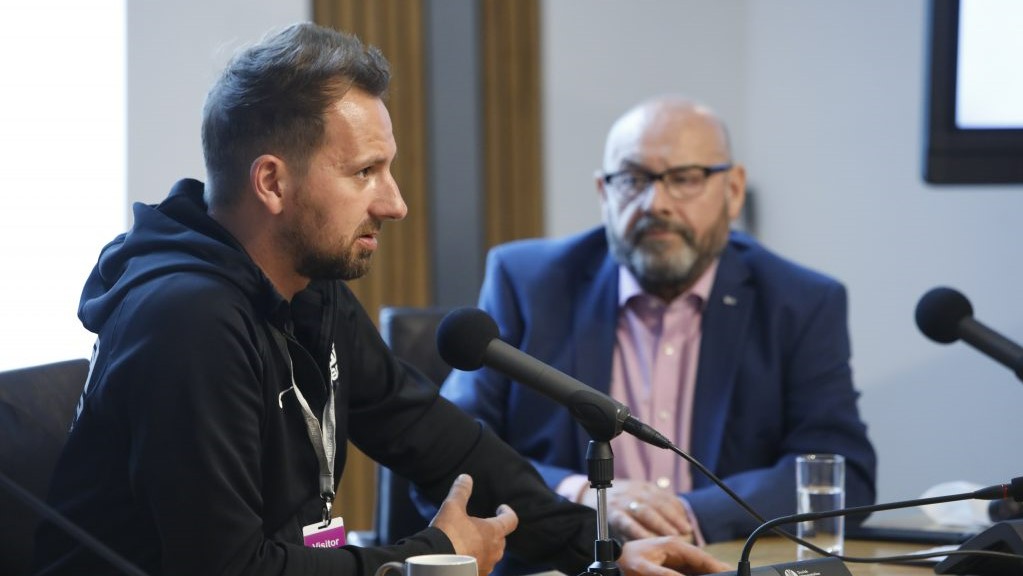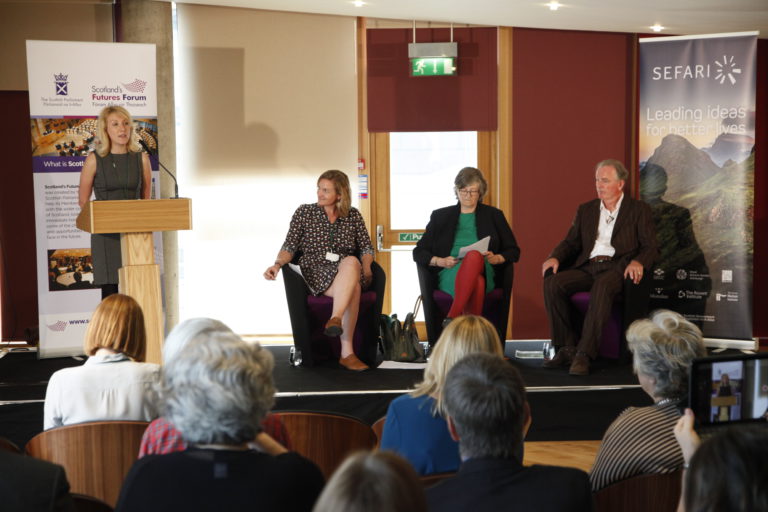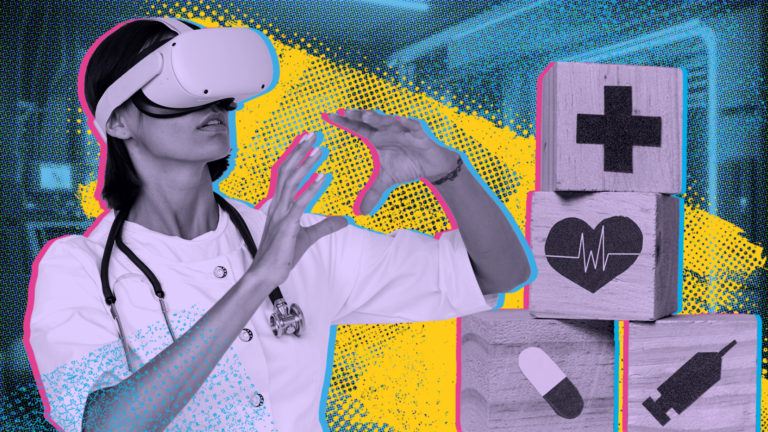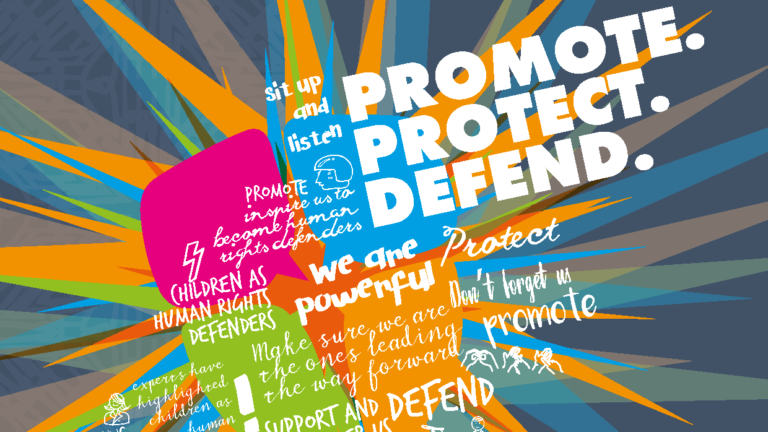Leaders in Sport & Physical Activity: David Duke
On Wednesday 29 May 2019, the founder and chief executive of Street Soccer, David Duke, spoke at the Scottish Parliament about his journey through sport and the lessons he has learned along the way.
Organised by the Futures Forum and the Scottish Parliament’s Information Centre (SPICe), this seminar was part of a series reflecting on how we can use the positive power of sport and physical activity to build a better future.
David spoke about his journey from homelessness to playing for and coaching Scotland in the Homeless World Cup (including as a winner in 2007) to becoming one of Scotland’s leading social entrepreneurs.
Chaired by James Dornan MSP, Convener of the Parliament’s Local Government and Communities Committee, this seminar was open to MSPs, their staff and Parliament staff.
Podcast
Listen to David’s presentation in this podcast:
Presentation Transcript
I run an organisation called Street Soccer Scotland, which uses football to tackle social exclusion. I will give you the story behind Street Soccer and how it came about, and put it in perspective in terms of the power of sport.
I grew up in Govan, in Glasgow. Sport was a big part of my life growing up: playing football in the streets, and playing for my school and my local boys’ club, Harmony Row. I always looked forward to it, but things were difficult at home. My father was an alcoholic, and his condition broke our family up. My mum left when I was 13, which left me with the decision of whether to stay with my mum or my dad. I chose my dad, because I felt that he needed some sort of support. Even though I was only 13, I felt that I was capable of providing that support.
When you’re that age and you’re looking after someone who has challenges with alcoholism, it becomes very difficult to maintain the things that we expect that children should take for granted, such as going to school or being part of a sports team. I decided to quit school, and I dropped out. As a result, I lost quite a lot of my friendships as well as access to sport through school. When your parents can’t afford to send you to the local boys’ club or sports club, everything becomes a challenge.
As a child, I experienced exclusion. As I moved into adulthood, my father passed away, which came as a big shock to me. I had not seen him for about a year, and when he passed away it took its toll on me, not in the first instance but later on.
Slowly but surely, I started to change my behaviour. At the time, I was working in a bar and I found myself going out drinking every night to try to mask the pain. My relationship with my girlfriend broke down, and I found myself homeless. Homelessness is something that you do not plan for or expect—when you’re a young guy, you don’t take it into consideration as it’s not part of your life.
My perception of homelessness was, “That isn’t me—it’s a guy sitting out in the street.” A lot of people have that perception. I felt a lot of stigma on becoming homeless; I remember avoiding people I knew so that I didn’t have to explain my situation. I was isolating myself from safety and from people who probably could have helped, but I didn’t want to ask for help because I was so embarrassed about my situation.
Homelessness is something that you do not plan for or expect
I was in Glasgow at the time—going back to 2000 or 2001—and things were pretty drastic. I was a young guy, not even 20, and I was being sent round all the old Glasgow City Council hostels on Bell Street, Cheapside Street and Broad Street. Before that, I spent about a month sleeping here, there and everywhere because I never actually knew where to go for help or how to access it.
I was going into a system that was dangerous and unsafe. I remember being in hostels on Bell Street and Broad Street, where you were just left in this wee room and you had nowhere to go and nowhere to be. The only relationships you could build were with people who were potentially going to bring you harm, although that wasn’t because they were bad people.
The hostel was a building full of 80 people who were all sick, and who all needed support and help and a chance to turn their life around. When everyone comes together like that, it does not work. You need to be able to take yourself out of that situation. I just used to lock myself away. I would try to scrape enough money for a bottle of cider and I would sit in the hostel room trying to pass the time until I went to sleep again.
Next, I went to a young person’s project run by Quarriers, on the west coast. It was supported accommodation where you had a support worker and your own living space with cooking and washing facilities—stuff that you never had at the big council-run hostels. I felt a bit safer, but again I woke up every day with nowhere to be and nothing to do, and very few positive role models in my life.
One day, I saw a poster advertising a tournament that the Big Issue was running. The magazine was looking for one of the first Homeless World Cup teams. It was asking players to come along for a tournament that all the different hostels in Glasgow—the Talbot Association, the Salvation Army and so on—were entering. From that, I was asked to train the Scotland Homeless World Cup team.
I remember that, at the time, I had to be dragged out even just to go to the initial tournament for the trials, because my confidence was so low. Taking the step to leave the hostel and go to a new place and meet new people was quite a big ask because my confidence and self-esteem were so low.
From that day on, I had a role model. My coach became my role model, and I had somebody to look up to.
Thankfully, I went. I met my coach Ally Dawson, the ex-Rangers captain, who showed a bit of faith in me and said, “Look, David—I want you to get involved.” From that day on, I had a role model. My coach became my role model, and I had somebody to look up to. I could ask him questions, not only about football but about life. We should remember that a lot of young people, when they are growing up, do not have positive role models or people they can ask life questions such as, “Why does this happen to my body?” or “Why am I feeling like this?” Not everyone has that, but I had that with my coach.
The tournament, which was in Gothenburg, was three months away, so suddenly I had some structure and something to look forward to. On Tuesdays and Thursdays, I knew that I had to be down at Glasgow Green for 12 o’clock.
When you’re living the life that I was living, you are pulled in loads of different directions, and you just try to get through the day quicker. If somebody presented you with the option of smoking hash or going drinking, you would probably do it, because there was nothing else to do. But now I had football, so on a Monday night I stayed in rather than going out—I wanted to make sure that I was fine for football.
I went to football and felt great afterwards—when I came back, I just wanted to chill out and watch the telly. That started some behavioural and lifestyle changes for me. I was going through the training programme, which gave me something to look forward to and something to do. I went to the tournament in Gothenburg and had a fantastic experience.
When I look back and reflect on what really changed and what started to work for me, it was about having a structure: having somewhere to go and somewhere to be. Exercising brings natural benefits for your physical and mental health. We all need to have a purpose in our lives, and football was my purpose.
When I reflect on what really changed, it was about having a structure: having somewhere to go and somewhere to be.
I went to the Homeless World Cup and had a great time. When the football stopped—we had done the World Cup, and that was it finished—I just went back to what I was doing. The next factor in play was that my support worker said, “Look, David—why don’t you start coaching kids? You’re quite chatty, and you’ve got good football knowledge.” I started volunteering with Mosspark Boys Club three nights a week, on Mondays, Wednesdays and Fridays.
Again, that plugged the gap and gave me a purpose: somewhere to be, somewhere to go and something positive to do. For the first time ever—or for the first time that I could remember—I recognised what self-worth was, because the kids looked up to me and the parents thanked me after sessions. I used to think that I was nothing, if you know what I mean. I felt worthless, and then suddenly I could see some worth in what I was doing.
The day that I started coaching kids’ football was the last time that I ever smoked hash or anything like that. In my head, I thought, “If I’m going to do this, I need to practice what I preach and I need to be a role model.” I went to college, and my life started to move forward because I’d found structure and positive relationships in my life—with the coaches I worked with, and the parents—that I could use and get some value from.
I got the keys to my house but, before all that, I had something to do and somewhere to be, and I had support. If I had gone into my house straight from a hostel, I might not have sustained living in that situation because I didn’t have all the other pieces in place. We all need three things in life: security, relationships and purpose. I never had any of that, but I had it when I was moving into my house. I had a support network and people who said, “Do you need a hand with painting your house?”
I spent the next few years training up as a coach and getting qualified as a community worker. In 2009, I was working as a support worker for the Big Issue during the day, and I was a youth worker on the south side of Glasgow, in Govanhill and Castlemilk, with Glasgow community safety services. I decided that I wanted to create my own project, which was Street Soccer. I was still seeing the people who were with me in hostels always doing the same stuff, and I felt very lucky that I had been given an opportunity and the right people came into my life at the right time. I just felt that we needed to do more.
We all need three things in life: security, relationships and purpose.
The reason that I set up Street Soccer was not to end homelessness or end mental health issues, but to tackle exclusion, because social exclusion creates those issues. I wanted to set up something that everybody could be part of, regardless of who they are.
It was set up not only for people who were experiencing homelessness—I didn’t want it to be labelled as a homeless football project or a mental health project, so we called it Street Soccer and it was open to all. If you need us, come along—it doesn’t matter who you are or what your background is; you’ll not be tagged. We call players players, and that’s it.
In 2009, I quit my full-time job, although I continued to work part-time with the Big Issue. I got a £3,000 start-up loan from Firstport, a social enterprise start-up. Then I started chapping doors, going round all the hostels and day projects—everywhere I could, and anywhere I could find people who had nothing to do and wanted something to be part of. Before I knew it, the numbers had started to swell, and things started to go from there. That is why the project was set up.
There are so many people out there who are being left behind. If you look at the detail of some of the troubles, problems and challenges that face our societies and communities—not just in Scotland, but around the world—you can see that it starts with exclusion. If you look at London, that is the case with youth crime and gang culture.
Those kids all needed to identify with and be part of something, but they were left behind, so they could only become part something of a negative nature. That sort of thing is usually driven by criminals, who are getting the kids involved. Those kids should be part of social clubs and sports clubs. Sadly, we are very good at excluding people.
We wanted to make sure that nobody is left behind, and we wanted to create a new message for people. If you look at how we currently talk about things such as homelessness, there are a lot of well-meant comms that actually create loads of damage. Take something like, “Help the homeless”, for example, which is often heard. When you put the word “the” in front of “homeless”, you create an us-and-them situation, as if people who are homeless are different.
With Street Soccer, we’ve always tried to take a different approach. The way that we do it is not always good for fundraising, because we don’t try to tug on heartstrings, but we believe that the comms that we create shouldn’t damage the people who we serve. If a charity shows images of hopelessness all the time and tells someone that they’re hopeless, they will take that on board. If you tell someone that they’re a champion and they have potential, they will reach that potential and become a champion. It is a self-fulfilling prophecy. If you are in a relationship and you continually accuse your partner of cheating, they’re going to end up cheating.
For us, it is about showing people their potential. Homelessness is a problem, but the people themselves are not. We’ve always tried to see the best in people, and tried to see their potential and show it to them. You can see the images and stories on the Street Soccer website. What we do is about resilience, strength and courage, because that is what our young people and adults in Scotland need to overcome some of the challenges that they face.
For us, it is about showing people their potential. Homelessness is a problem, but the people themselves are not.
We know about the levels of poverty, including child poverty, and the damaging impact that that will have on people’s lives. We need to tackle that as we go forward, but we need to do it in a way that allows people to believe in themselves. If we don’t believe in someone, how are they supposed to believe in themselves? We all need that belief. My coach Ally Dawson believed in me—he said that I had something, and I tried to fulfil that. For us, it is about showing people their potential.
It goes back to the idea of waking up with a goal. We all need that—whether you’re a father or mother, a brother or sister, an employee or a member of a church, everybody has to wake up with a goal. Imagine the feeling of waking up with no goal, and with nowhere to be. Imagine how dangerous that is.
When we talk about sport, we often talk about success and medals. That is part of it—sport was created as a competition—but for Street Soccer, sport is a way of bringing people together, and a way to foster relationships and provide safe places. There is a lot to learn from sport in both winning and losing, and in how you manage things. Sport can be a salvation for this country, but we need to make sure that everyone can access it.
I go running every week. That is not to do with my fitness; it is because running clears my head. When you’ve got difficult decisions to make and you’re dealing with people emotionally and trying to work things out all the time, you can get clogged up. There’s nothing better than going on a quick run and clearing your head—well, I say “run”, but it’s more of a fast walk or a slow jog.
I will show you a quick video of one of our players talking about what sport means to him from a player’s perspective. It is very powerful. It is about how sport makes him feel—it is all about being part of something. That is the “why?” aspect that we sometimes miss.
A lot of reports have been written recently about the demise of youth clubs and social spaces that allow people—especially young people—to interact. Sport provides access to youth work, support and all those things. That is what is really important.
As you can probably imagine, I could talk all day about this. For me, sport is a way of creating a catalyst and a platform to enable people to change by bringing them together and fostering relationships so that when they wake up, they’ve got somewhere to go and somewhere to be, and they can access the support that they need.
That is how we use sport at Street Soccer, and that is how many great organisations in Scotland are trying to address social exclusion. There is some great work being done, and there are some great collaborations in trying to tackle homelessness. We provide the emotional support that people need, but the physical stuff has to be addressed as well. Working together is the best way to do it.
Speaker biography
David Duke, from Govan in Glasgow, is the founder and chief executive of Street Soccer Scotland, a social enterprise that uses football to create positive change in the lives of socially disadvantaged adults and young people in Scotland.
He has experienced homelessness, and some of the problems that face the people his organisation serves, making him one of the best placed people to inspire, deliver and advise on social inclusion programmes that use sport as a vehicle for change.
David is also Global Ambassador for the Homeless World Cup organisation, a competition which he won as coach of the Scotland team in 2007. In 2018, he received an MBE in recognition of his contribution to sport and socially disadvantaged people.

This seminar was part of a series from Leaders in Sport and Physical Activity. Information about all the seminars is available here:






